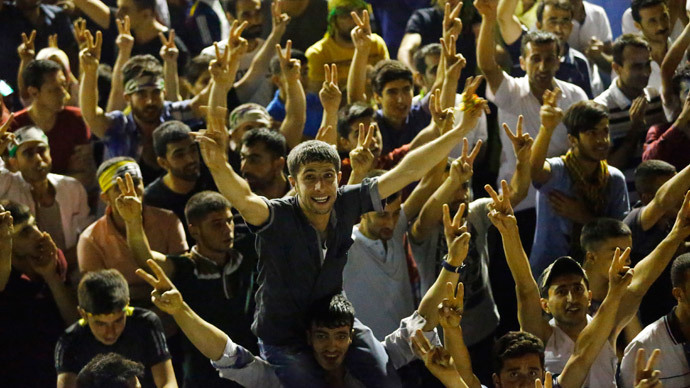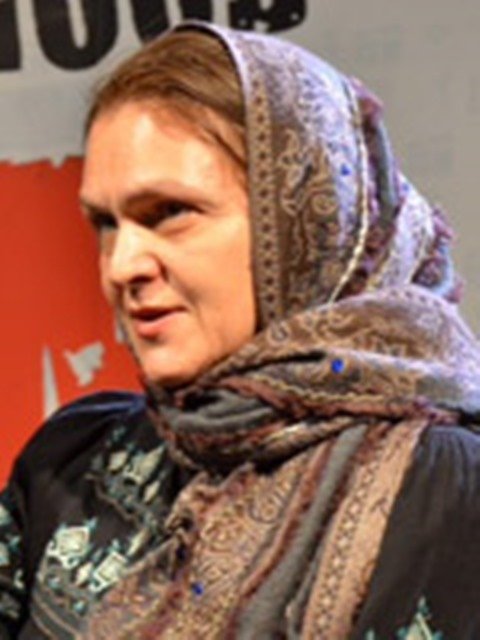Choosing a future: What the Kurdish minority’s parliamentary triumph means for Turkey

So it’s official now: the pro-Kurdish People’s Democratic Party (HDP), a fairly marginal political group just a year ago, has suddenly emerged as the big winner in the Turkish parliamentary election.
It has managed to rack up some 13 percent of the vote and thereby taking 80 out of the 550 seats in parliament.
This has effectively stripped President Recep Tayyip Erdogan’s AKP of its parliamentary majority and undermined the political prospects of the Middle East’s once most successful partisan president.
It’s too early to predict the outcome of this victory, now that a very large mechanism, the so-called Kurdish factor, has been activated in the region.
“We are HDP, we are in the parliament,” people were chanting walking through the streets of Istanbul. On Sunday night, it was very easy to tell a Turk from a Kurd, as the latter were celebrating the victory.
Essentially, they were celebrating their victory over the one who had helped them overcome the long-term notion of being terrorists, and gave them equal rights.

By 10 pm, Istanbul was filled with sporadic exultations of the minority, while the majority was now contemplating the minority from a new perspective.
The Kurdish party virtually became the favorite of this election, despite finishing in a modest fourth place. Kurds were dancing, clapping their hands, chanting and cheering. Glowing with happiness, they invited everyone to share their victory.
The police was about to put up their shields against a spontaneous celebration in downtown Istanbul. However, they suddenly decided to pack up and leave the vociferous, but peaceful crowd to carry on their festivities.
Next Monday has been announced as a public day off, so the celebrations are bound to continue.
It is the first time a pro-Kurdish party has won seats in parliament. Kurds make up one-fifth of Turkey’s population, but on Sunday night, they seemed to be everywhere. Even inside the election press center, you could instantly tell members of the two communities apart. If someone was gleaming with joy, you could safely bet they were Kurdish.
The society was transforming literally before our very own eyes.
The rejoicing Kurds look as if they became the parliamentary majority.
Literally all of them - women with head scarves, and those without any head cover; posh young people driving their convertibles, and workers pushing their trolleys, the poor and successful middle class alike - demonstrated a kind of joy that wasn’t yet fully understood. They were all rejoicing but not quite realizing yet what this victory meant for them.
Police pushing demonstrators back looks like some HDP folks trying to calm demonstrators in their ranks pic.twitter.com/eSmnw3IzRT
— Lucy Kafanov (@LucyKafanov) June 8, 2015
A week before the election many had doubts that the HDP would even cross the 10 percent threshold. Moreover, the first data from the polling stations wasn’t very promising either. The pro-government agency informed that President Erdogan’s party had received 56 percent of the vote. Between 8 pm and midnight, this number dropped to 40 percent.
At the end of the day, the AKP has taken 258 seats, losing its parliamentary majority – and the right to form a government. Meanwhile, opposition leaders have already announced their parties would not enter into a coalition with the AKP. This effectively renders Erdogan’s ambitious plans for rewriting the Constitution and transforming Turkey into a presidential republic unattainable.
Ironically, such an outcome of the election had been largely predicted by opinion polls and expert assessments by public officials. And yet it has taken everyone by surprise.
Erdogan did not show up at the AKP rally following the vote. That was understandable: for the first time in thirteen years of constant victories, the Turkish president has nothing to celebrate.
Prime Minister Ahmet Davutoglu, the formal leader of AKP, did deliver a speech, urging the Turks to reform the Constitution and bring about a presidential republic. But his calls didn’t sound very appealing this time, and news broadcasters covering the AKP rally quickly switched to covering street celebrations by the jubilant Kurds.
Diyarbakir right now. hdp rally. Mostly being conducted in kurdish pic.twitter.com/xDSA9Q4E1a
— Shabtai Gold (@velvetart) June 8, 2015
One in five voters in Turkey is Kurdish. The Kurds are the most religious community in the country, and yet they have not supported Erdogan’s Islamist party. This was despite the fact it was Erdogan who brought about a dramatic change of status for Turkey’s Kurdish minority, something even his political opponents tend to acknowledge.

Some twenty years ago, as much as openly identifying oneself as a Kurd, constituted an act of rebellion in Turkey. For about five decades, it was considered synonymous to being a radical leftist, waging an incessant guerilla war and plotting numerous terrorist attacks all over the country.
The Soviet Union supported the Kurds in their insurgency by providing weapons. Following its collapse, Israel gradually developed relationships with Kurdish minorities across the Middle East, establishing itself as the Kurds’ new patron and using the Kurdish state trump card against its opponents in the region. The Israelis apparently saw Kurdish Nationalism as a useful tool for keeping Turkey and its ambitious leader at bay.
Supporters cheer on the HDP victory just a few feet from where twin blasts ripped through an #HDP rally on Friday. pic.twitter.com/D3IS8hMaMR
— Lucy Kafanov (@LucyKafanov) June 7, 2015
The Erdogan government managed to upset that strategy by courting the conservative, religious part of the Kurdish community and effectively marginalizing the leftist, Marxist and Anarchist Kurdish groups. Erdogan and the AKP have reconciled the Turks and the Kurds by promoting Islamic unity while stating their commitment to ethnic diversity. The Kurds were granted the right to study in their own language, have their own mosques and media outlets, and receive support and certain privileges from the government.
The June 7 election has undermined all these years of hard work for Erdogan.
READ MORE: Two killed, over 100 wounded in blasts at pro-Kurdish rally in Turkey
Shortly before the vote, Erdogan made the mistake of publicly arguing that Turkey doesn’t have a Kurdish issue. Despite Erdogan’s personal contribution to actually resolving that issue, his opponents exploited the blunder to the full, and the religious majority of Kurds, who used to vote for Erdogan, denied him their support and voted for Kurdish candidates instead.
Two days ahead of the election, two bombs went off at a pro-HDP rally in Diyarbakir, the largest city in the predominantly Kurdish Southeast Turkey. Two people were killed. President Erdogan denounced the terrorist attack as a provocation and, rather belatedly, offered his condolences to the victims’ families.
And it does not matter whether this or something else has affected the public preferences.

The collapse of the lira after the election results were announced, was the first precursor of the looming instability.
The outcome of an election in Turkey is not limited to percentages and seats in parliament. Perhaps, no one in Turkey will dare to forecast what will be the ultimate ramifications of this new political setup. The final results are to be released by the Election Commission in 10-12 days.
Turkish society is so polarized that even the front runners among independent candidates, who had been expected to make it into the parliament, failed. The well-known Turkish footballer Hakan Sukur did not get enough votes. You need to realize that football is an extremely popular sport in Turkey.Sukur could have got the votes of protest voters – back in 2013 he left Erdogan’s party.
Judging by the preliminary election results available today, no independent candidate has won a seat in the parliament.
Many media outlets have made premature attempts to give up on Turkey’s Islamists. However, there is no clarity on this point.
What happened in reality is that the pro-Kurdish party managed to accumulate the protest vote. Founded in 2012, it first proclaimed itself to be the party of all minorities, not just ethnic ones. There is even an LGBT faction at the HDP, though they were not making a show of themselves at the festive demonstrations.
Some people now start to remember that the Kurdish party leader Selahattin Demirtas used to criticize the work of the Religious Affairs Directorate, the tool that technically helped establish a truce between the Kurds and the Turks. Othersrecall what he said last year at a meeting in support of the Palestinians, amid Israel’s bombing campaign of Gaza, that Erdogan had better sever all economic and military relations with Israel, instead of shouting slogans.

Thepublic election-caused elationwill soon subside. Turkey is facing a number of pressing issues such as the economic downturn, unemployment and now a parliamentary crisis and difficulties of forming a government, which could lead to another early election being called.
What will Erdogan and the opposition choose to do? Will they deliver a solution to the crisis? What part will the two million Syrian refugees in Turkey, who got a warm-hearted brotherly reception there, play? How will the war raging in Syria affect the situation? There is no immediate response to any of these questions.
Turkey, once the most confident and powerful state in the region, has suddenly found it self on the brink of plunging into political and economic instability with no clear solutions to the problem.
Experts on Middle East have become used to the state boundaries being redrawn in bold virtual strokes from time to time. Many of them still remember the map showing a Kurdish state placed by the generous hand of political schemers where the present-day Turkey, Syria, Iraq and Iran are located.
Will another scheduled election be a step in this direction, or will the Middle Easts spiral into another whirl of sprawling war,or will Turkey stand firm? – All these global questions have been brought in to light by the moderate success of the pro-Kurdish party.
The statements, views and opinions expressed in this column are solely those of the author and do not necessarily represent those of RT.
The statements, views and opinions expressed in this column are solely those of the author and do not necessarily represent those of RT.













